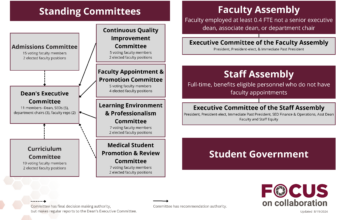College of Medicine Faculty Handbook

Welcome to Roseman University College of Medicine!
As the Senior Executive Dean of Faculty Affairs and Learning Innovation, it is my pleasure to welcome you to our vibrant and dynamic academic community. At Roseman, we are committed to fostering an environment of innovation, collaboration, and excellence in medical education. Our collective mission is to not only educate the next generation of compassionate and skilled physicians but also to lead the way in shaping the future of healthcare through cutting-edge pedagogy and a deep commitment to our community.
Your role as faculty is integral to our success. Together, we will push the boundaries of traditional medical education, ensuring that our students are not only clinically proficient but also equipped with the empathy, ethics, and critical thinking skills necessary to serve our community effectively.
I look forward to our journey together as we inspire, innovate, and impact the future of medicine.
Sincerely,
Marin Gillis, PhD, LPh
Senior Executive Dean, Faculty Affairs & Learning Innovation
Roseman University College of Medicine
Disclaimer
The RUCOM Faculty Handbook includes links to institutional policies and procedures pertinent to college faculty and college governance. It is not intended to be comprehensive nor to address all the possible applications of, or exceptions to, the official policies and procedures of RUHS and RUCOM. Faculty are encouraged to refer to the RUHS Faculty Handbook. Roseman University College of Medicine employees are also encouraged to refer to the RUHS Employee Handbook. Some of the topics described in this handbook are covered in detail in official policy and procedure documents of RUHS and RUCOM as well the RUCOM Faculty Bylaws. We encourage you to refer to these official documents and policies for specific information since this handbook may only briefly summarize those policies, procedures, and institutional guidelines. Failure to comply with any university or college of medicine policy is grounds for disciplinary action up to and including termination. Please note that the terms of the full official policies are controlling in the case of any inconsistency. This handbook is not written to confer any rights or privileges on faculty or impose any obligations on RUCOM. Every effort has been made to compile a Handbook that is as accurate and up-to-date as possible. However, this faculty resource is considered a “live” document that is updated iteratively and on an as-needed basis. The handbook was last updated March 10, 2025.
See also, the current list of recently updated University and College policies in PolicyStat.
Introduction
University & College Organization
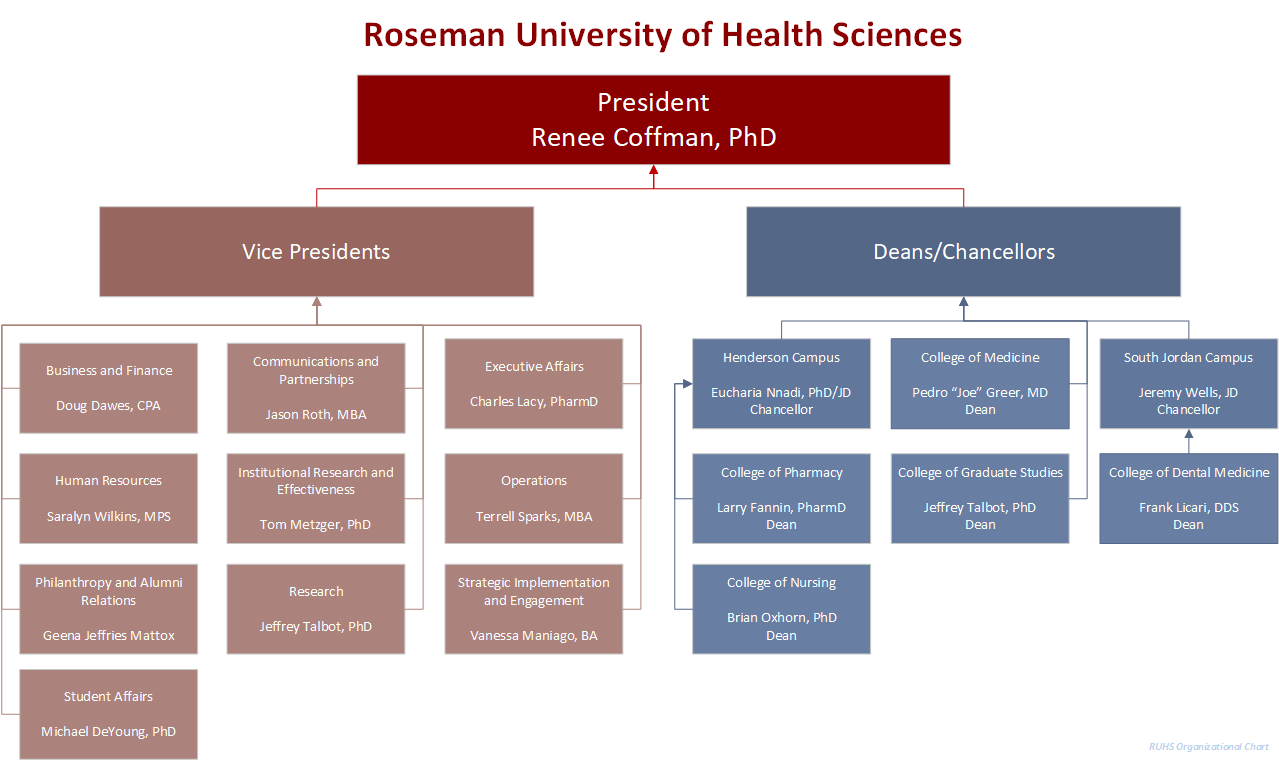 Read more about the University level leadership.
Read more about the University level leadership.
College of Medicine Organization
The College of Medicine is led by the Office of the Dean and is organized into three departments and five offices.
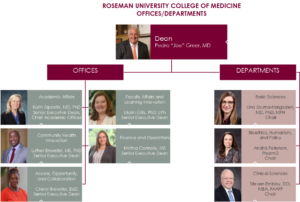
College of Medicine Offices |
College of Medicine Departments |
|---|---|
College of Medicine Governance
Faculty Appointment & Rank
Any person who supervises a medical student’s learning experience, or evaluates the student performance, including through curriculum development, assessment, and experiential learning, must have a faculty appointment or be a medical resident or fellow in good standing. (Faculty Appointment Policy §1.0)
Library access
The Roseman University of Health Sciences Library serves all faculty, students, and employees at RUCOM.
- Access to the College of Medicine Program Guide
- Online access to thousands of medical and scientific journals, databases, and books
- Assistance from our reference librarian staff
Professional Development
Through the Office of Faculty Affairs and Learning Innovation, faculty enjoy a wide array of opportunities to enhance teaching and learning skills, assessment and evaluation abilities, educational research, leadership skills such as:
- Regular training, workshops, and other development opportunities for foundational and clinical educators
- Weekly Preceptor newsletter for clinical educators
- Cultivated faculty development resources and programs in the areas of Professional Development, Educator Development, Researcher Development, Organizational Development, and Personal Development
The Faculty Appointment and Promotion Committee (FAPC) must deliberate and make a recommendation for all faculty appointments including rank determination before an offer of employment is made. (Faculty Appointment Policy §2.0 & §3.0(1))
FAPC deliberation shall include consideration of the qualifications, achievements, and potential contributions of candidates using the guidelines outlined in the Faculty Appointment and Promotion Guide to make rank recommendations to the dean. (Faculty Appointment Policy §3.0(2))
- Regular Faculty: Regular faculty are employed by Roseman University College of Medicine to teach students. Regular faculty titles include Instructor, Assistant Professor, Associate Professor, and Professor. Regular faculty titles may be modified by “research” (e.g., Research Assistant Professor, Research Associate Professor, Research Professor). (Faculty Appointment Policy §4.0(1))
- Clinical Practice Faculty: Clinical practice faculty are employed by Roseman University College of Medicine to provide patient care at Roseman Medical Group. Clinical Practice Faculty may teach health sciences students incidental to their clinical work. Clinical faculty Practice titles include Clinical Practice Assistant Professor, Clinical Practice Associate Professor, and Clinical Practice Professor. (Faculty Appointment Policy §4.0(2))
- Clinical Faculty: Clinical faculty are community clinicians or clinicians employed by clinical affiliates who teach medical students. Clinical faculty are not employed by Roseman University College of Medicine, but they may be paid a small stipend through an affiliation agreement or on an independent contractor agreement. Clinical faculty titles include clinical instructor, clinical assistant professor, clinical associate professor, clinical professor. (Faculty Appointment Policy §4.0(3))
- Community Faculty Associate: Community faculty associates are non-academic community members who make important contributions to the educational mission of the college of medicine mainly through experiential learning. Community faculty associates are not employed by RUCOM and are not eligible for promotion. (Faculty Appointment Policy §4.0(4))
- Special Appointment: Adjunct, Dual, Emeritus, Visiting –
Adjunct: Primary appointment at another university or at a different college at Roseman University of Health Sciences.Dual: Appointment across two departments within the college of medicine.Emeritus: Appointment as Emeritus faculty is an honorary appointment granted by the President in recognition of years of service and contributions to the university.Visiting: Visiting faculty appointments are provided to a professional who contributes to the academic and/or research endeavors of the college. Responsibilities to the college are as per the contractual agreement, which may or may not include remuneration. (Faculty Appointment Policy §4.0(5) & RUHS Emeritus Policy)
Review the Quick Guide to Faculty Types to learn more about the different faculty designations.
Full-time regular or clinical practice faculty: RUCOM-employed faculty on the payroll with an effort of .80 FTE or greater (includes visiting faculty, postdoctoral associates and fellows, medical librarians). (Faculty Appointment Policy §5.0(1))
Part-time regular or clinical practice faculty: RUCOM-employed faculty on the payroll with an effort of less than .80 FTE (includes visiting faculty, postdoctoral associates and fellows, medical librarians). (Faculty Appointment Policy §5.0(2))
Full-time clinical faculty: Community clinicians employed full-time at a hospital or health system with which RUCOM has an active affiliation agreement. Clinical faculty are not employed by RUCOM, but they may be paid a small stipend or on contract. (Faculty Appointment Policy §5.0(3))
Part-time clinical faculty: Community clinicians who work for a medical practice, hospital, or health system with which RUCOM does not have an active affiliation agreement or who work part-time for a hospital or health system with which RUCOM has an active affiliation agreement. Clinical faculty are not employed by RUCOM, but they may be paid a small stipend or on contract. (Faculty Appointment Policy §5.0(4))
Annual Review
All faculty and senior leaders must be reviewed annually. Review is developmental in nature.
Promotion & 5 Year Contracts
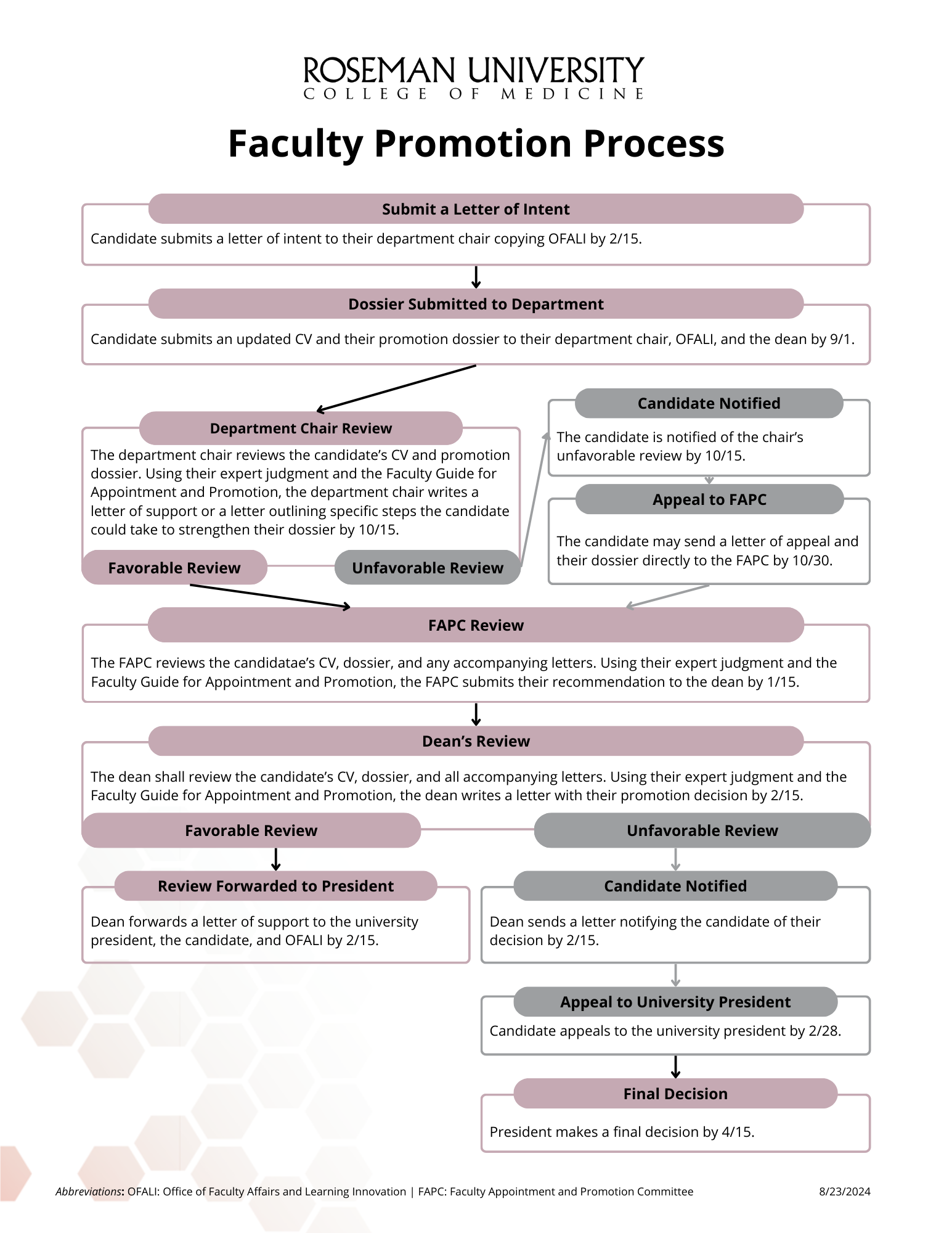
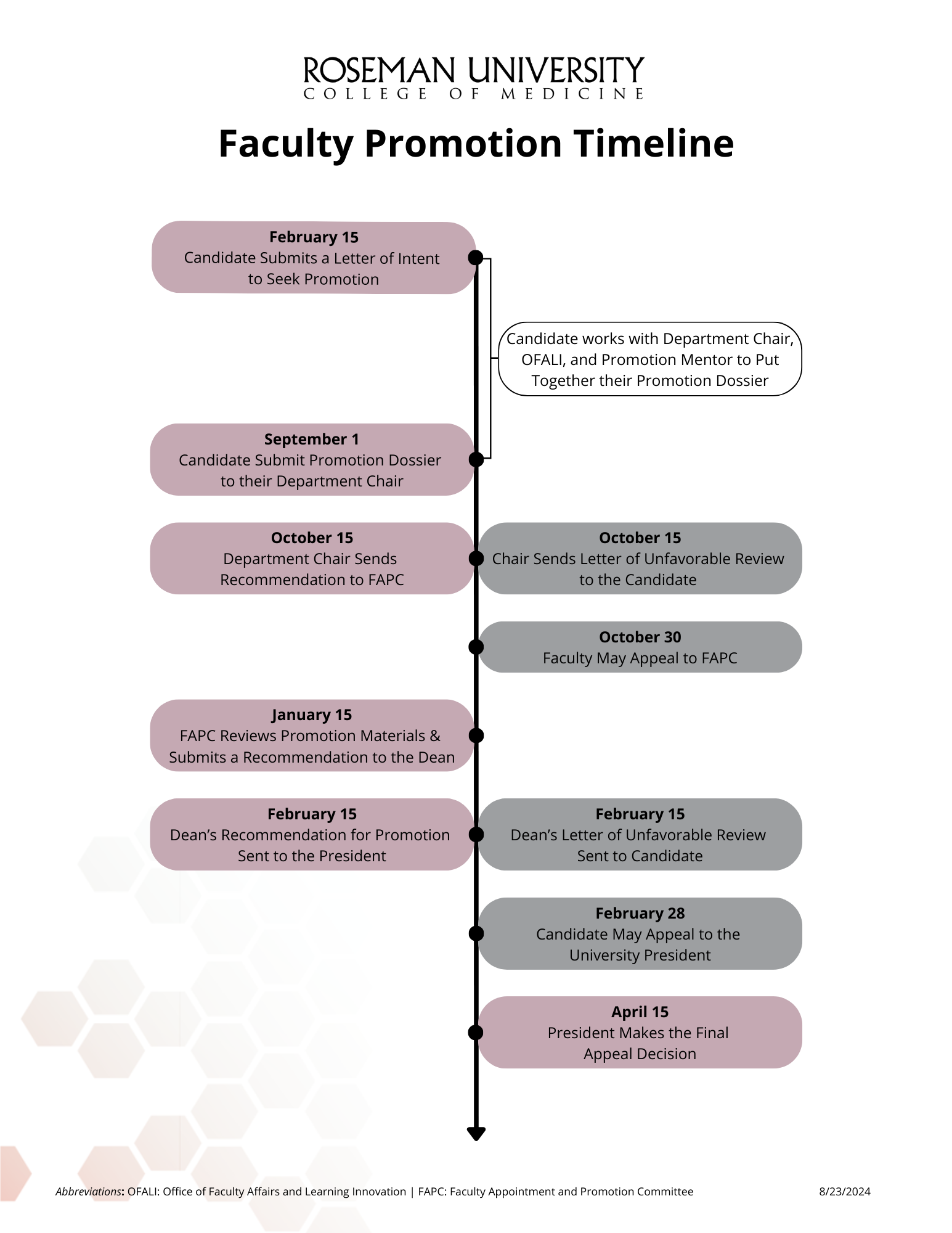
Faculty Promotion
Faculty promotion at RUCOM is governed by the Faculty Promotion Policy and follows the Faculty Promotion Procedure.
View a .pdf of the Promotion Process and Timeline.
View a .pdf of the Faculty Guide for Appointment and Promotion.
Faculty Five-Year Contracts
RUCOM faculty may apply for a five-year renewable contract according to the Five-Year Contract Policy.


